"The Carnation Revolution." How the Portuguese Army carried out a peaceful revolution
Salazarism
To understand the reasons for what happened on April 25, 1974, it is necessary to turn to the previous historical period, which is associated with the name of António de Oliveira Salazar (1889–1968). He received a Catholic education, in 1914 he graduated with honors from the Faculty of Law of the most prestigious university in Portugal - the University of Coimbra. In 1917, he headed the department of political economy and finance at this university.
On March 28, 1927, Salazar gave his famous “two economies” speech. In particular, he noted that there are two economies: supporters of one consider success and wealth to be the main goal of human activity, while supporters of the other teach to despise wealth and identify poverty with virtue. According to Salazar, both of these positions are wrong. The main thing is the lack of balance in consumption. The solution to the problem is creating wealth through hard work, regulating consumption by human moral standards, physical and intellectual development, and savings.
In 1928, power was seized by General Oshcar Carmona, who invited Salazar to the post of Minister of Finance and agreed to give him broad powers. Salazar pulled the country out of a protracted economic crisis, reorganized the banking and tax systems, and paid off a large foreign debt. The minister proved himself to be an effective manager: in one year he eliminated the budget deficit and stabilized the Portuguese currency (escudo). By establishing fiscal discipline and aggressively cutting costs and inefficiencies, the new finance minister achieved a budget surplus unprecedented in Portuguese history. This made it possible to increase spending on defense, economic and social development.
In 1932, Salazar became prime minister, but Carmona continued to serve as President of Portugal until his death on April 18, 1951. In 1933, a new constitution was adopted for Portugal, which gave Salazar, as prime minister, virtually unlimited rights, establishing a right-wing authoritarian regime in the country. Most historians characterize Salazar's rule as a dictatorship, others as a fascist regime.
– Salazar wrote in 1958.
The ideology was based on three pillars: “God, homeland and family.” Salazar's course for sustainable development was supported by the army, the church, the aristocracy, monarchists, the right, then the middle class and the wealthy peasantry - those who benefited from his rule.
Salazar relied on the development of the elite, a kind of folk-aristocratic society. The prime minister spoke out against political parties because they divide society. The majority of the population, taking into account the previous chaos and devastation, supported such a course.
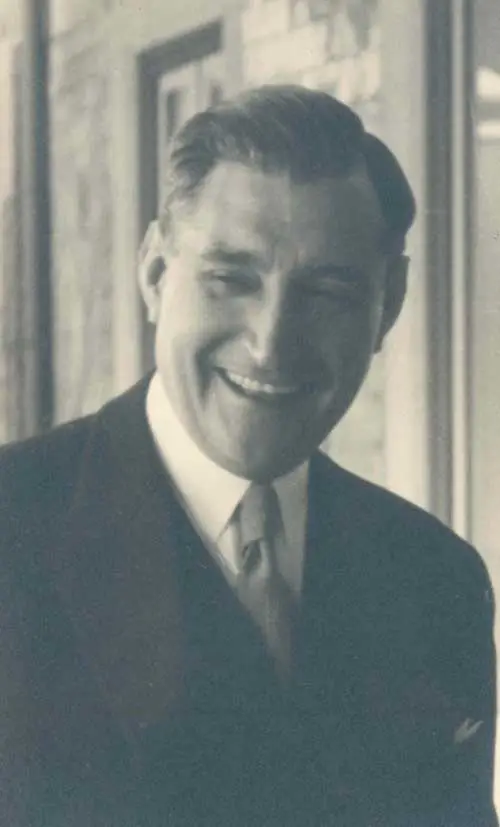
António Salazar in 1939, aged 50
New State
Salazar introduced the concept of the "New State" (Estado Novo), based on the doctrine of corporatism. He declared the goal of his dictatorship to be stabilization. The Constitution, adopted in 1933, was based on the ideology of corporatism and was declared "the first corporate constitution in the world."
The Portuguese corporate state had common features with Italian fascism, but Salazar himself distanced himself from the fascist dictatorship, which he regarded as a pagan Caesarian political system that did not recognize any legal or moral restrictions. He also assessed German Nazism.
On the eve of World War II, Salazar noted:
The ruling and only party was the National Union (considered not a party, but a national movement). The state paramilitary organization Portuguese Legion played a significant role in the administration. The first head of the Portuguese Legion is professor-economist Joao Pinto da Costa Leyte. He was the prime minister's closest associate and confidant and became Salazar's successor as finance minister. A convinced and active corporatist, Costa Leite was the leading ideologist of the regime.
Created in 1933, the secret police (PIDE) persecuted both communists and fascists. The directors of PIDE - Agostinho Lourenço, Antonio Neves Graca, Omero de Matos, Fernando Eduardo da Silva Pais - were Salazar's closest associates. At the same time, Salazarism was relatively mild; the death penalty was prohibited in Portugal. And the repressive measures were mainly targeted, against opposition activists.
During World War II, Salazar followed a middle path policy. He supported Franco's Spain but did not ally with Nazi Germany. At the same time, Lisbon was closed to the influence of Western powers. From an economic point of view, Portugal benefited greatly during the war, became rich from supplies to the Axis countries, and developed its industry.
Salazar himself lived modestly and did not accumulate wealth. I almost never traveled abroad. He avoided publicity, populism, and suppressed attempts to create a cult of personality. I wanted to preserve the “true Portugal” – peasant, religious.
– said Antonio Salazar in 1962.
In 1940, Life magazine called Salazar "the greatest Portuguese since Henry the Navigator."
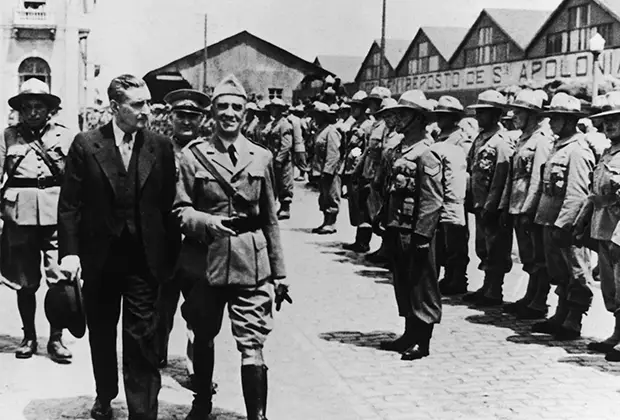
Salazar inspects troops before their departure to Portugal's African colonies, 1950
Successes
The country before Salazar was agrarian, literally poor and one of the most underdeveloped in Europe. The land belonged to large owners. The basis of the economy was agriculture. Industry was dominated by small handicraft light industry enterprises (textile, fishing, clothing, and other industries). All existing large enterprises belonged to foreign (British) capital.
Salazar replaced generals in the government with university professors. For 40 years, the university served as the main supplier of senior political leadership. This made it possible to modernize the country and make it industrial and agricultural.
Salazar's economic program was based on autarky (reliance on one's own strength), protectionism, and state intervention in economic development. Foreign investments were accepted carefully so as not to fall into bondage. The external debt was repaid, and gold and foreign exchange reserves grew rapidly. Financial stability made it possible to spend additional funds on the army, the development of industry, communications, the construction of hydroelectric power stations and ports, on education and social assistance. This allowed Portugal to emerge from the global crisis of the early 1930s without any problems. The problem of food security was solved: Portugal began to provide itself with wheat.
During World War II, the emphasis was on industrial development. The country has become well enriched. Thus, during the war years, Portugal's gold reserves increased from $63,3 million in 1938 to $438 million in 1946. Under the guise of neutrality, Portuguese industrialists and traders made good money. The country has established petrochemical, steel, electrical and radio engineering, and automotive industries. In the 1950s and 1960s, annual growth in national product averaged 4,1%, higher than at any other time in the Portuguese economy.
In the 1930s, 70% of the population was illiterate, and in 1970, 15% remained illiterate. At the same time, among minors aged 7 to 14 years, the number of literate people increased to almost 100%. That is, there was no special emphasis on eliminating illiteracy, but the process was moving at a good pace.
Thus, at the time of Salazar's death, Portugal was a much more developed country than before he came to power. The country has consistently developed. There were problems, but they tried to solve them.
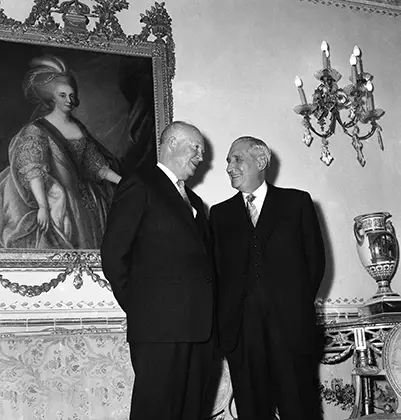
US President Dwight David Eisenhower with Antonio Salazar at the Queluz Palace, 1960
Reasons for the death of the New State
Portugal's sore spot is its enormous military spending. In the 1928–1929 fiscal year, for example, they made up 23,4% of the budget. In 1970, 58% of the budget was already spent on these purposes. Naturally, this led to a drop in social spending.
By 1945, Portugal maintained a large colonial empire: the Azores, Madeira, Cape Verde, Sao Tome and Principe, Angola, Guinea-Bissau, Cabinda and Mozambique in Africa, Diu, Daman and Goa in India, Macau in China and East Timor in South-East Asia. In 1961, India returned Goa, as well as Daman and Diu. An uprising began in Angola in 1961, in Guinea-Bissau in 1962, and in Mozambique in 1964. In the colonies (mainly in Africa) it was necessary to maintain a large part of the army and spend huge amounts of money fighting the rebels.
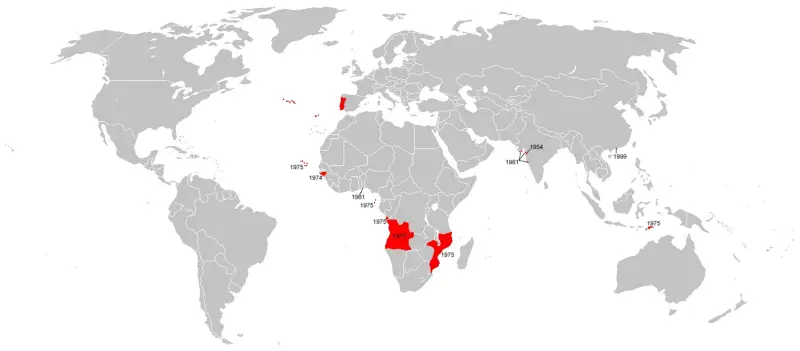
Map of the Portuguese colonial empire during the New State period
The military themselves, who often acted as punitive forces, were tired of the war and wanted a better life and to return home. As a result, the main support of the New State was the army, and it was destroyed.
The main prerequisite for the death of Salazar’s state is its rather rapid development. New generations did not know how bad it was before. But they saw how “beautifully” and “freely” they live in more developed capitalist countries - France, England or the USA. We saw the successes of the USSR. They did not want to live frugally, emphasizing frugality, self-control and hard work. Young people wanted freedom, to live here and now.
People did not want to fight to preserve the colonial empire, which gave Portugal the resources it needed to maintain independence. The Portuguese lost their passion; they wanted to “just live now” without clinging to the past.

Portuguese military column. Mozambique
In the 1960s, the emigration of Portuguese to France, Holland, England, Brazil, Venezuela, and Canada became widespread. In 1962–1972 About 1 million people emigrated (out of a population of 8 million). The bulk of the Portuguese left for France (600 thousand people).
In 1968, Salazar's health was seriously undermined by a stroke, and he could no longer govern the state. Antonio was not told about this in order to protect the leader’s health. They staged a large-scale performance for him: they held fake government meetings, gave him documents to sign, which were then destroyed, and prepared special editions of his favorite newspaper in a single copy every day. This continued until July 1970, when Antonio Salazar died.
The country was led by another professor at the University of Lisbon, Marcelo Caetano, who previously held prominent government positions. He tried to maintain continuity and at the same time carried out limited liberalization (the so-called Marseille Spring), but without success.
Caetano came to be perceived as Salazar's "second edition", but without the authority of its predecessor. Both the left and the right opposed him.
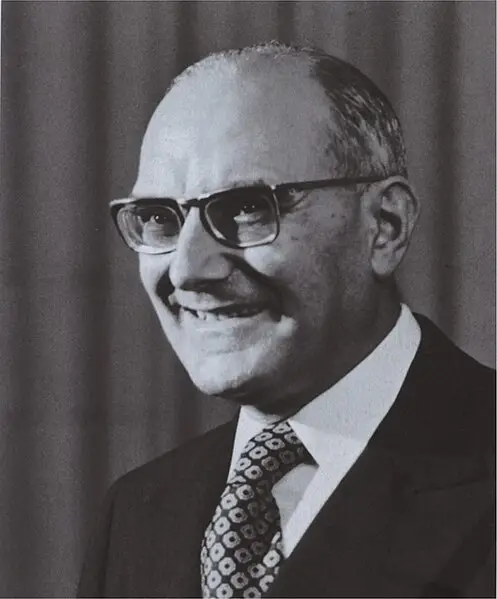
Marcelo José das Neves Alves Caetano (1906–1980) – Portuguese lawyer, politician and statesman, Prime Minister of Portugal from 1968–1974. One of the leaders of the New State, successor to António de Oliveira Salazar as head of government.
Password – “Courage”, review – “For Victory”
The coup was prepared and carried out by the “Captains' Movement,” which united part of the Portuguese officer corps, which was dissatisfied with the regime of Marcelo Caetano (ruled 1968–1974), the protracted colonial war in Africa and their social position. The ground forces officers preparing the military coup (most of the ground forces were located in Angola, Mozambique and Portuguese Guinea) counted primarily on the military units under their command. Probing in the Air Force and Navy units showed that there are also many military personnel dissatisfied with the regime.
Secret police were on the trail of the conspirators. Therefore, on April 22, 1974, the decision was made to begin the performance. On April 24, at 22:1, the headquarters of the Armed Forces Movement was established at the location of the engineering regiment No. XNUMX in Pontinha (Lisbon). The operation was led by: Major Otelo Saraiva de Carvalho, Lieutenant Commander Vitor Manuel Crespu, Major Jose Sanches Ozorio, Lieutenant Colonel Garcia dos Santos, Lieutenant Colonel Fischer Lopes Pires, Major Hugo dos Santos and others.
The operation followed two signals from the Emissores Assosiados di Lizboa radio station. On April 24 at 22:55 the song “After Farewell” by Paulo di Carvalho was performed. This did not surprise anyone: the song was popular (three weeks before it had been performed at Eurovision) and quite banal in meaning (about love).
Then, in the early hours of the night on April 25, on the Renacensa radio station, the announcer will read the first stanza of the song “Grandula, vila morena” (“Grandola, the dark village”), then this song was broadcast by its author, José Afonso. This was already strange, since the song, dedicated to the shooting of a strike in a village in the south of Portugal and saying that power should be in the hands of the people, had long been blacklisted. And Jose Afonso himself fled to France.
At about 4 a.m. on April 25, military columns marched toward Lisbon. The rebels also blocked the border with Spain, where the Franco regime ruled. At 4:20 a.m., soldiers of the 5th Infantry Regiment in Lisbon occupied the commercial radio station Radio Club Portugues, which had a powerful radio transmitter. “Communique No. 1” of the “Captains’ Movement” is read on air. The military called on citizens to stay in their homes and remain calm, and police and paramilitary commanders not to resist, as they could lead to heavy casualties. Then the radio station began broadcasting songs banned by the government.
At 7:30 a.m., a new message from the rebels came out that the Movement was aimed “at liberating the country from the regime that had oppressed it for a long time.”
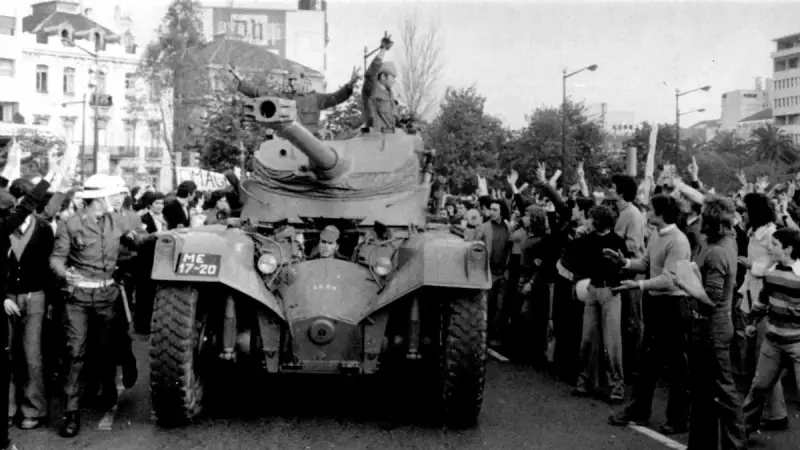
The vast majority of Lisbon residents joyfully greeted the participants in the military coup
"Overthrow fascism!"
After the delivery of the first communiqué, residents of the capital, contrary to the call, poured out into the streets of the city, joyfully greeting the rebels. According to legend, the “Carnation Revolution” got its name from the gesture of Lisbon resident Celeste Seyros, a department store saleswoman, who lowered a carnation into the barrel of the rifle of a soldier she met. It was carnation season, and following her example, citizens began distributing red carnations to soldiers en masse.
On the embankment of the Tagus River, the column of Captain Salgueiro Maya from Santarém collided with a column tanks, reinforced by artillery, which moved towards Terreiro do Pas, where government offices are located. The government forces were commanded by the Deputy Commander of the Lisbon Military District, Brigadier General Reyes. The townspeople blocked the tanks. Reyes ordered to shoot. Captain Salgueiro Maia shouted into a megaphone: “We have risen in rebellion to end the war in the colonies, to overthrow fascism!” The tankers refused to carry out the order and went over to the side of the rebels.
There was practically no resistance. Soldiers, sergeants and junior officers themselves arrested commanders who tried to resist. By 9:30, all units of the Lisbon Military District had gone over to the side of the rebels; they controlled almost all important objects. The people fully supported the rebels, fed and watered the soldiers.
At 10 o'clock the main barracks of the National Republican Guard in Carmo Square, where Prime Minister Marcelo Caetano and his supporters were hiding, were blocked. At 14:30 he was given an ultimatum to resign. At first the ultimatum was rejected. But when it became clear that the situation was hopeless, Caetano did not offer any resistance, asking only to “transfer power to some general, and not to the mob.” This general was initially made by Antonio di Spinola.
At 17 o'clock the barracks capitulated, at 18 o'clock Caetano, the Minister of the Interior Moreiro Batista and the Minister of Foreign Affairs Rui Patricio transferred power to General Spinola. Power in the country officially passed to the National Salvation Council, headed by General Spinola.
The former prime minister was deported to Brazil. The ex-president of Portugal, America de Tomas, was also sent to Brazil. Caetano viewed the Carnation Revolution as a national disaster that led to the loss of sovereignty, enslaving dependence on other countries and deprived Portugal of its resource base (colonies). In many ways he was right.
The only resistance was provided by the PIDE - International Police for the Defense of the State (Portuguese secret police and intelligence service) at the headquarters in the old part of the city. On the evening of April 25, a crowd approached the building and fire was opened on it. 4 people were killed and about 40 were injured. On the night of April 26, the PIDE headquarters was occupied by troops. PIDE director Fernando Silva Pais was arrested (died in custody). The crowd killed one Gestapo man and tried to tear several more to pieces, but they were repulsed by the soldiers.
In general, the coup was relatively bloodless, the regime completely rotted and collapsed without a fight.
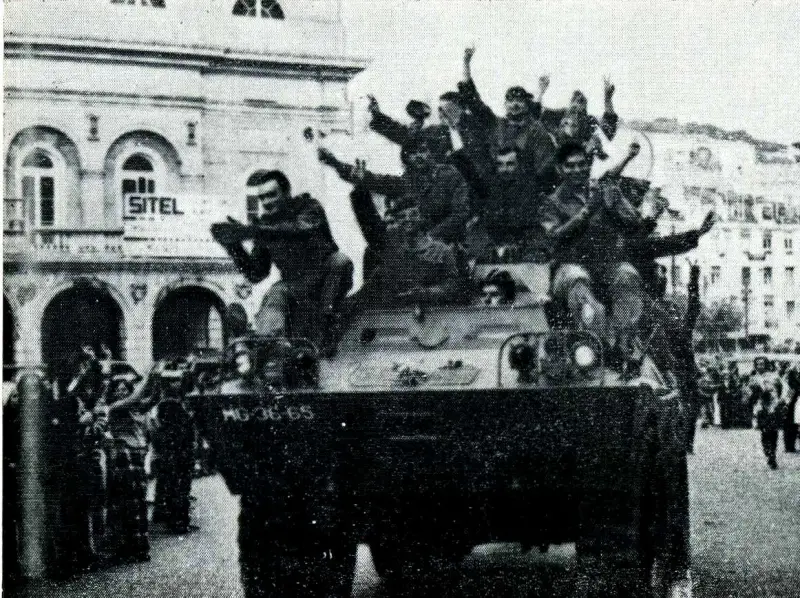
Rebels enter Lisbon
Aftermath
The old Portugal, the colonial empire, is a thing of the past. The Portuguese lost their passionary spirit and ceased to be a people with imperial traditions. The following years were difficult times. Tough disagreements in the camp of the winners, where there were right-wing, social democratic groups and supporters of full-fledged socialism. Attempts at new coups.
Constant socio-economic crises: loss of colonies, cheap raw materials, growing dependence on more developed Western economies. From the early 1960s until the mid-1970s (1974 coup), the Portuguese economy experienced steady growth. Average annual indicators: GDP - 6,9%, industrial production - 9%, consumer spending - 6,5%, gross fixed capital formation - 7,8%, with inflation not exceeding 4% per year. During this period, GDP grew by 120%. After the coup, a long period of economic turmoil began with a drop in average annual economic growth rates. Between 1973 and 1988, Portugal's public debt to GDP ratio quadrupled to 74%.
Refugees poured into the country from former colonies (mainly from Angola and Mozambique), having lost their livelihoods. Their number exceeded 1 million people, with a metropolitan population of 8,6 million in 1970. At the same time, during the period of the “income equalization” policy and “anti-fascist purges”, an outflow of managerial and qualified technical personnel to other countries (mainly to Brazil) began.
Interestingly, the colonies also did not benefit from “freedom” from the Portuguese metropolis. There, white colonialists, usually qualified specialists, were expelled, and the economic growth that had occurred under Salazar’s “New State” ceased. A period of severe civil wars began. The new states still fell under the influence of the great powers, becoming part of the neocolonial system.
Thus, the coup benefited transnational finance capital, which came to dominate the former Portuguese colonial empire.
That is, the people only lost from the coup in terms of welfare. As a result, Portugal remained a relatively poor periphery of Western Europe, but without the remnants of a colonial empire.
On March 25, 2007, Salazar took first place (41% of the votes) among ten finalists in the voting of the TV show “The Great Portuguese”, by a large margin ahead of Vasco da Gama (0,7%) and Prince Henrique (Henry the Navigator) (2,7%) and other famous Portuguese.
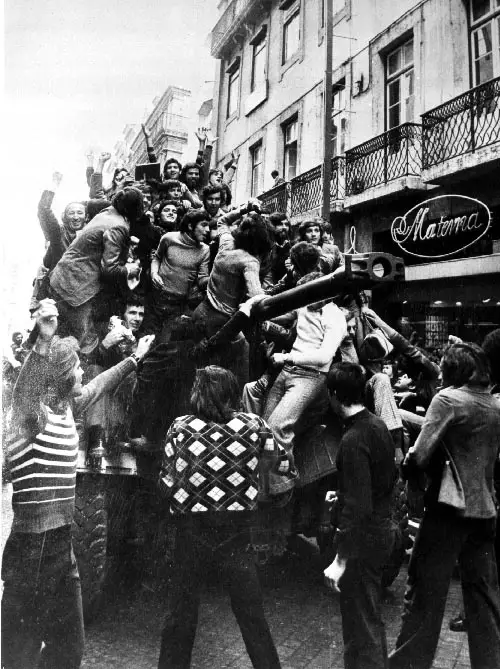
People and army united during the Carnation Revolution
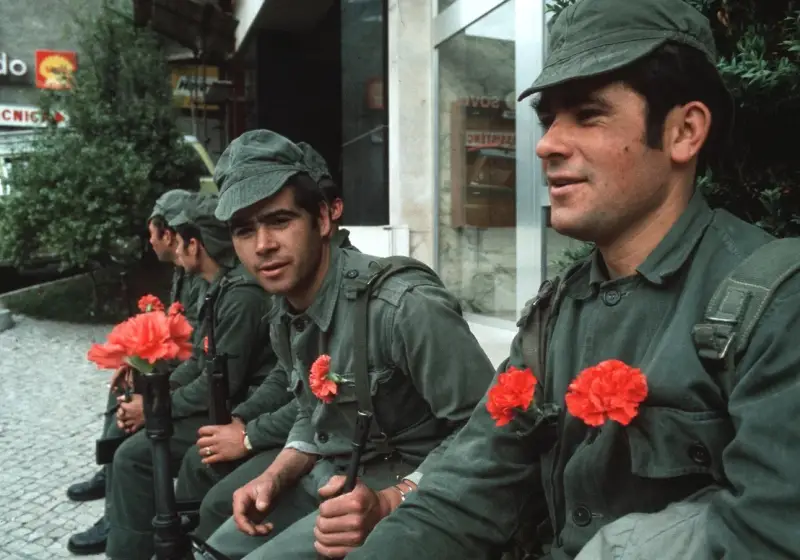
Information